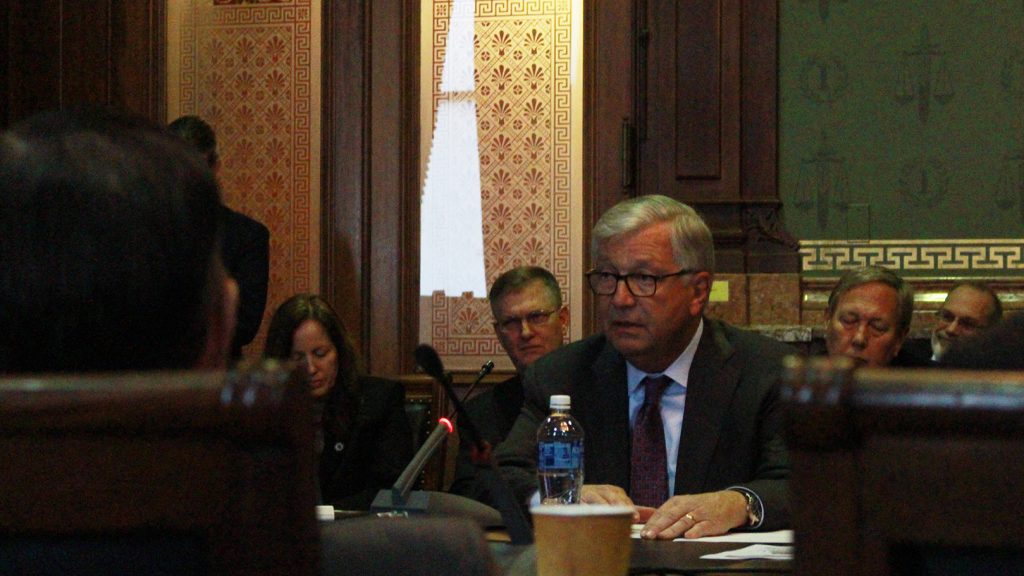Iowa university leaders make 2020 funding pitch to state lawmakers
Leaders of Iowa’s regent universities are making the case for funding to ensure graduates are ‘future ready.’
Regent President Mike Richards addresses the Iowa House Appropriations Committee at the state Capitol in Des Moines on Feb. 21, 2018. The meeting allowed regent university presidents to advocate for the Legislature to fund their institutions’ fiscal 2019 appropriations requests.
January 29, 2019
Presidents of the state Board of Regents universities — Iowa State University, the University of Iowa, and the University of Northern Iowa — met with Iowa lawmakers at the state capitol in Des Moines on Tuesday to advocate for a funding boost in fiscal 2020.
Overall, the regents are requesting an $18 million increase in funding — $7 million each for the UI and ISU, and $4 million for UNI — for the three public universities to fund resident undergraduate financial aid.
In the last two decades, Iowa’s regent universities have seen the revenue composition shift from being funded by two-thirds state appropriations and one-third tuition to roughly one-third state funding and one-third tuition dollars, regents’ documents show.
The changing revenue makeup and rising tuition rates has prompted students to fund their education with student loans. According to data from the Iowa College Student Aid Commission report, referenced in the UI’s presentation to the subcommittee, UI graduates with debt from the class of 2016 had an average of $27,715 in student loan debt. The UI reports that 45 percent of its students graduate with no student-loan debt.
The trend of dwindling funding has left university leaders skeptical of a funding increase, but approving of Iowa Gov. Kim Reynolds’ budget proposal.
In Reynolds’ budget recommendation for fiscal 2020 and 2021, she outlined her hope to fully fund the regents’ request with an $18 million appropriations increase. Ultimately, this is just a recommendation and it is up to the state Legislature to pass a budget to the upcoming fiscal years.
“The governor’s budget supports many of the board’s top initiatives,” Regent Executive Director Mark Braun wrote in a statement following the release of Reynolds’ budget proposal. “With this level of funding, our universities can continue to provide the accessible, top-quality education that Iowa students deserve.”
RELATED: After consistent budget cuts Iowa Gov. Kim Reynolds proposes funding boost for Iowa regent universities
UI President Bruce Harreld told The Daily Iowan in December 2018 there seems to a be a view that higher education is “an expense to be cut,” but he thinks the universities are “a major driver of the economy, and as we cut it, it has a negative impact.”
He said when advocating for the UI in Des Moines, the university can highlight micro issues, such as research and economic development.
“… Research adds new people, and those people join our community, they buy homes, they buy automobiles, their kids go to our schools, so that’s how you grow an economy,” he said. “… We’ve got a lot of faculty around here with incredible insights, and we’ve got property and patents, and the next question is what do we actually do to invest and build jobs and build economic growth in Johnson County, Linn County, eastern Iowa, around that, and I think there’s a lot that we can do.”
Sen. Herman Quirmbach, D-Ames, whose district includes ISU, said while he hoped the Legislature approved the governor’s funding request, it wouldn’t be enough to offset two rounds of budget cuts totaling $35 million in the previous two budget years.
“That’s only putting back slightly more than half of what’s been cut in the past two years,” Quirmbach told the DI on Tuesday.
RELATED: Reynolds remains confident in ability to fund budget priorities
Sen. Tim Kraayenbrink, R-Fort Dodge, chair of the education-appropriations subcommittee, predicted that out of Reynolds’ total education budget, the Legislature would not quite match but would come close to funding almost all of the proposal.
The UI’s presentation also emphasized how the university prepares graduates to be “future ready,” keeping in line with the Future Ready Iowa legislation Reynolds championed in 2018. The law aims to ensure 70 percent of Iowa’s workforce receives education or job training beyond high school by 2025.
A 2016 Iowa Workforce Development report highlights jobs that require a degree such as physician assistants and operations research analysts that are projected to grow in the coming years — fields for which the UI says it has programs in place designed to build and educate the workforce needed to meet Iowa’s skilled labor demand.
“In all of our universities and community colleges — they are all responsible for training our younger generation and second-career students to be employed,” Kraayenbrink told the DI on Tuesday.
Julia DiGiacomo, Marissa Payne, and Sarah Watson contributed to this report



